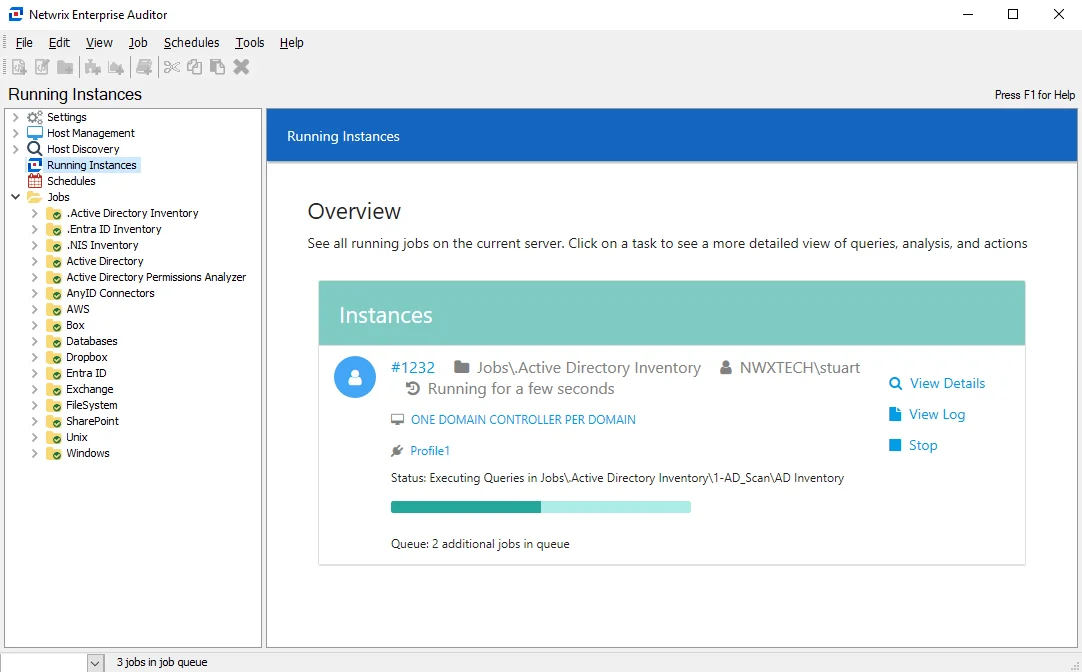Exchange Solution
The Exchange Solution provides auditing and reporting on multiple aspects of the Exchange environment to assist with identifying risk, understanding usage, and decreasing bloat. Areas of focus include Audit and Compliance, Maintenance and Cleanup, Metrics and Capacity, Operations and Health, Public Folders and Configuration Baseline. Sensitive Data Discovery searches mailboxes and public folders to discover where sensitive information of any type exists. This requires the Sensitive Data Discovery Add-on.
Supported Platforms
-
Exchange Online (Limited)
-
Exchange 2019 (Limited)
-
Exchange 2016 (Limited)
-
Exchange 2013
-
Exchange 2010 (Limited)
See the Exchange Support and Permissions Explained topic for additional information.
Requirements, Permissions, and Ports
See the Target Exchange Servers Requirements, Permissions, and Ports and Target Exchange Online Requirements, Permissions, and Ports topics for additional information.
Sensitive Data Discovery Considerations
The Sensitive Data Discovery Add-On must be installed on the Enterprise Auditor Console server, which enables Sensitive Data criteria for scans.If running Sensitive Data Discovery (SDD) scans, it will be necessary to increase the minimum amount of RAM. Each thread requires a minimum of 2 additional GB of RAM per host.For example, if the job is configured to scan 8 hosts at a time , then an extra 16 GB of RAM are required (8x2=16).
NOTE: The Sensitive Data Discovery Add-on installation package installs the appropriate JDK (Java) version on the server. The JDK deployed is prepackaged and does not require any configuration; it has been preconfigured to work with Enterprise Auditor and should never be customized through Java. It will not conflict with other JDKs or Java Runtimes in the same environment.
Location
The Exchange Solution requires a special Enterprise Auditor license. It can be installed from the Enterprise Auditor Instant Job Wizard. Once it has been installed into the Jobs tree, navigate to the solution: Jobs > Exchange.
Each job group within the solution collects data, analyzes the data, and reports on the target Exchange environment, with the exception of the 6. Distribution Lists job group that only analyzes data and generates reports. The EX_UserOverview job runs analysis on the collected data and generates reports.
Job Groups
The Exchange Solution is divided into categories based upon what is being audited.

The following job groups comprise the Exchange Solution:
-
1.HUB Metrics Job Group – Comprised of data collection, analysis and reports that focus on mail-flow activity occurring within your organization. This job group goes out to each server that contains the Message Tracking Logs and parses the log to return the data to the Enterprise Auditor database.
-
2.CAS Metrics Job Group – Comprised of data collection, analysis and reports that focus on remote connections (Outlook Web Access, ActiveSync, and Outlook Anywhere Access) occurring within your organization. This job group goes out to each server that contains the IIS Logs and parses the log to return the data to the Enterprise Auditor database.
-
3.Databases Job Group – Comprised of data collection, analysis and reports that focus on database sizing, growth, and trends
-
4.Mailboxes Job Group – Comprised of data collection, analyses, and reports around mailbox features, logons, permissions, and sizing
CAUTION: It is not recommended to run this job group at this job group level.
- See the Recommended Configurations for the 4. Mailboxes Job Group topic for this job group. All jobs within this group are compatible with the Office 365 environment.
-
5. Public Folders Job Group – Comprised of data collection, analysis and reports that focus on public folder sizing, content aging, entitlement, ownership, and the identification of each public folder’s Most Probable Owner. The Most Probable Owner is a unique algorithm built into the public folder data collector that is determined based on folder ownership, content posted, and size of content posted.
-
6. Distribution Lists Job Group – Lists the direct and effective membership to distribution lists in addition to providing context around potentially stale distribution lists
-
7.Sensitive Data Job Group – Comprised of jobs which locate sensitive data found in mailboxes and public folders in the Exchange environment
-
8.Exchange Online Job Group – Comprised of jobs that locate sensitive data found in mailboxes and public folders in the Exchange environment
-
EX_UserOverview Job – provides correlation from multiple data collection points to show information for each user about their mailbox size, mailbox access rights, mail-flow metrics and remote connectivity to the Exchange environment. These reports provide user impact analysis on the environment. This job depends upon multiple job groups.
The MAPI-based data collectors require both Enterprise Auditor MAPI CDO and Microsoft Exchange MAPI CDO to be installed on the Enterprise Auditor Console server. Once these have been installed, configure the Settings > Exchange node for proper connection to the Exchange server. See the Exchange topic for additional information.